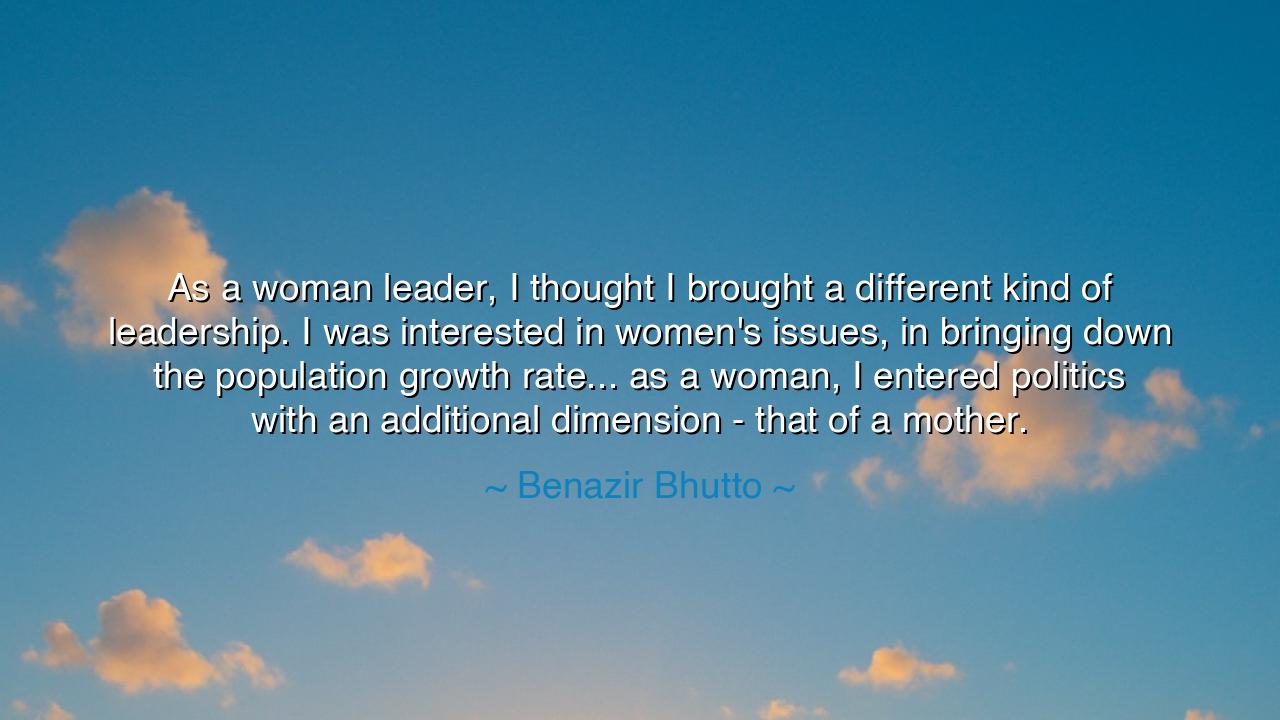
As a woman leader, I thought I brought a different kind of
As a woman leader, I thought I brought a different kind of leadership. I was interested in women's issues, in bringing down the population growth rate... as a woman, I entered politics with an additional dimension - that of a mother.






Hear, O listeners, the words of Benazir Bhutto, the daughter of courage, who bore both the crown of power and the cross of sacrifice: “As a woman leader, I thought I brought a different kind of leadership. I was interested in women’s issues, in bringing down the population growth rate… as a woman, I entered politics with an additional dimension—that of a mother.” These words are not mere reflections, but a cry from the heart of a woman who broke barriers in a world long ruled by men. She knew that her presence was more than symbolic—it was transformative, for she carried into politics not only the vision of a leader, but the compassion of a mother.
What does it mean to speak of a different kind of leadership? For ages, leadership was cloaked in the armor of men, shaped by war, conquest, and the pursuit of power. But Bhutto, stepping into that ancient arena, carried with her the essence of womanhood, which does not conquer by force but nurtures by care, protects by foresight, and builds by compassion. Hers was leadership that considered not only the strength of armies or the wealth of treasuries, but the health of children, the dignity of women, and the future of generations yet unborn. This was the additional dimension she spoke of, the unseen strength that only a mother’s heart could bring into the realm of politics.
She declared her interest in women’s issues, for she knew that the chains that bind women bind all of society. Where women are silenced, nations stumble; where women are uplifted, nations rise. By addressing population growth, education, and health, she sought to break cycles of poverty and oppression. This was not the narrow interest of one group, but the broad vision of a leader who understood that the prosperity of women is the foundation of the prosperity of all. Like the ancients who honored the goddess as giver of life, Bhutto saw that leadership rooted in the care of women and children was leadership that secured the future.
Consider how history bears witness to this truth. Recall Queen Elizabeth I of England, who spoke of having “the heart and stomach of a king,” yet also ruled with the foresight of a mother, guarding her realm as though it were her household. Her reign brought stability, prosperity, and the flowering of the arts, not through brute force alone, but through careful stewardship and the wisdom to balance strength with nurture. So too did Bhutto carry the mantle of both ruler and mother, striving to protect her people with the vigilance of a parent watching over a household.
Yet Bhutto’s words must also be heard in the shadow of her fate. For she walked a path fraught with danger, where her very identity as a woman in power stirred opposition. Still, she did not shrink. She bore both the pride of her people and the weight of their expectations, knowing that her presence in the halls of power was itself a declaration: that women, too, have a place in shaping the destiny of nations. Her life was both triumph and tragedy, but through it all, she embodied the truth that leadership wears many faces—and that the face of a mother may be the most powerful of all.
The meaning of her words, O children of the future, is this: true leadership is not one shape, one voice, or one path. It is made richer by diversity, by the inclusion of perspectives born of different lives, struggles, and loves. A mother’s compassion, a woman’s insight, these are not weaknesses but strengths that deepen the capacity to govern wisely. Where others see politics as power, she saw it as stewardship, as the duty to guard and nurture a people, much as a mother guards and nurtures her child.
Therefore, let this be your lesson: in every circle of leadership—whether in family, in community, or in nation—value the voices of women, and honor the strength of compassion. Do not mistake gentleness for weakness, nor motherhood for limitation. For in these dwell powers that can heal societies, guide nations, and shape futures. As Bhutto proclaimed through her life and words, the greatest leaders are those who carry both vision and love, both strategy and care, both the heart of a ruler and the soul of a parent.
So, children, when you lead, carry this truth within you: lead not only with strength of mind, but with strength of heart. Seek not only victory in the present, but the flourishing of generations to come. For as Benazir Bhutto revealed, the noblest leadership is that which unites wisdom with compassion, and power with the spirit of a mother.






AAdministratorAdministrator
Welcome, honored guests. Please leave a comment, we will respond soon